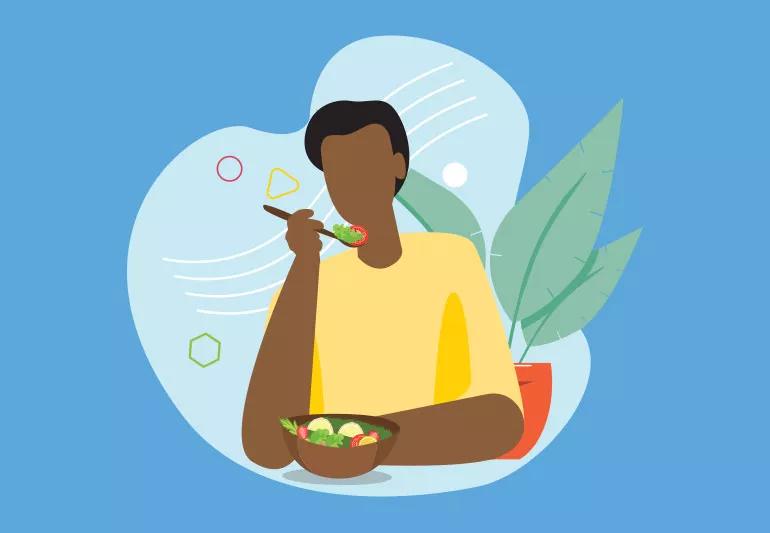How a dieting mindset keeps the weight on

We’ve all been there — after a month of being “good” on your New Year’s diet, you attend a party (mask on, of course) for the big game that’s bursting with treats.
Advertisement
Cleveland Clinic is a non-profit academic medical center. Advertising on our site helps support our mission. We do not endorse non-Cleveland Clinic products or services. Policy
Suddenly, corn chips and chili dip are calling your name, and you can’t concentrate on the game because you’re spending all of your mental energy trying to avoid those tempting treats.
When you finally give in, you feel guilt, shame and lowered self-esteem.
Combine these feelings with the idea that since you’ve blown your diet, you might as well eat more before you go back to being “good” tomorrow, and you have weight gain.
So, how can you get rid of the guilt and reset your brain to make smart choices?
Dietitian Anna Taylor, MS, RD, LD, CDCES, and bariatric behavioral health expert Leslie Heinberg, PhD, talk about how to change your thinking around dieting.
Dieting may seem like a great New Year’s resolution, but when we limit how much we eat, it can affect our body in ways we didn’t predict.
“Several things happen in our bodies when we restrict our food intake,” says Taylor. “We know that our metabolism slows, and the hormones that regulate our feelings of hunger and fullness get out of whack. You end up overeating, not because you are bad or weak, but because your body is doing everything it can to get out of your self-imposed famine.”
Even when you’re not actively on a diet plan, your dieting mindset can cause you to eat more and gain weight. You may eat more than you normally would, anticipating that soon, you’ll be back on a restrictive diet.
Advertisement
“From an evolutionary perspective, our bodies are more tuned to survive in times of famine,” Taylor says. “The body of the yo-yo dieter is accustomed to having random times of food shortage or restriction. Therefore, the body strives to eat and store more overall. The human body does not like to lose weight, so it fights back.”
Several studies have shown that restrictive dieting ultimately leads to weight gain, not weight loss. But studies have also shown that self-esteem can predict dieting outcomes.
“When you work on reducing your guilt and shame around food and better body image acceptance, you tend to develop better eating habits over the long term,” says Dr. Heinberg.
A dieting mindset also tells you that your food decisions reflect on your worth as a person.
You are eating “bad” foods, so you must be a bad or weak or unworthy person. This can perpetuate a cycle of emotional eating that adds excess weight, reduces self-esteem and is tough to end.
Work on stopping the negative thoughts in your head and adopt these tips to encourage a better relationship with food and eating healthy.
Ultimately, what works for weight loss in the long-term is small, incremental changes to your overall eating patterns. And the less you focus on restricting and categorizing foods and the more you focus on creating healthy behaviors around food and exercise, the healthier your body — and mind — will be.
Advertisement
Learn more about our editorial process.
Advertisement

This diabetes medication can treat obesity, but it’s not for people who just want to drop a few pounds

Successful weight loss takes a long-term commitment — build a healthy lifestyle you can stick with

Opt for snacks that have protein, fiber and healthy fats to prevent cravings and keep you feeling full and satisfied

Weight loss may cause loose, sagging skin and muscle loss to your rear

Rapid weight loss from the medication may decrease your overall muscle mass

Fat exits your body in your breath, pee and sweat

It can, but it isn’t sustainable, lacks nutritional balance and you’ll likely regain weight as soon as you start eating adult foods again

Consuming all of your calories in an eight- to 12-hour timeframe may help you drop pounds

The tropical fruit is a good source of antioxidants and vitamin C

Most people fall asleep within 10 to 20 minutes, but if your experience is different, adjusting your sleep schedule may help

Exploring your hidden side can lead to better understanding of what makes you tick